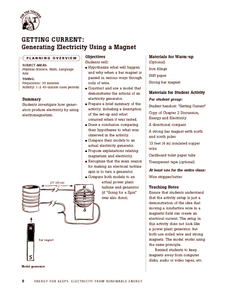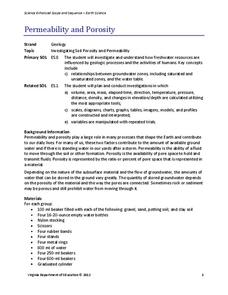NASA
Cleaning Water
Give young scientists a new appreciation of fresh, clean drinking water. After learning about the ways astronauts recycle their air and water, your class will work in small groups creating and testing their very own water filtration...
NASA
Cleaning Water
From their sweat to the water vapor in their breath, astronauts recycle every possible drop of water while in space. After watching a short video describing the different ways materials are recycled and reused in space shuttles, young...
Curated OER
Moon Mining
Go on a moon mining expedition from the safety of your classroom with this space exploration simulation. Using simple models of the moon's surface prepared ahead of time by the teacher, young scientists are challenged with locating and...
Micron Technology Foundation
Early - Weather and Seasons
Young scientists from any region can take a scientific journey and be exposed to weather changes that include rain and snow.
Energy for Keeps
Getting Current: Generating Electricity Using a Magnet
Give your class a magnetic charge with this creative experiment designed to teach emerging scientists about electromagnetism. Pupils construct a model that demonstrates the function of an electrical generator and test this creation in a...
Virginia Department of Education
Physical and Chemical Properties of Water
How can you effectively provide detailed concepts of water properties to your high school class in a way they find exciting and challenging at the same time? By letting them play, of course! Through a variety of experiments, pupils...
Virginia Department of Education
Prokaryotes
Lead your biology class on a cell-sized adventure! Emerging scientists construct models of prokaryotes, then design an experiment to properly grow a bacterial culture. They conclude the activity by viewing the culture under a microscope....
K20 LEARN
Transpiring Trees: Plant Transpiration and the Water Cycle
Looking for a tree-rific addition to your water cycle unit? Teams of young foresters examine the role of transpiration in the water cycle through a week's worth of activities. Pupils analyze how trees take in and transport water during...
Science 4 Inquiry
Edible Plate Tectonics
Many people think they can't observe plate tectonics, but thanks to GPS, we know that Australia moves at a rate of 2.7 inches per year, North America at 1 inches per year, and the Pacific plate at more than 3 inches per year! Scholars...
Science 4 Inquiry
An Investigative Look at Florida's Sinkholes
In May of 1981, the Winter Park Sinkhole in Florida first appeared and is now referred to as Lake Rose. Scholars learn about the causes of sinkholes through an inquiry project. Then, they analyze recent data and draw conclusions to...
Science Matters
Eruptions and Volcano Types
The Mammoth Lakes area regularly releases warnings to hikers and skiers to be careful because melting snow releases trapped gases from volcanic vents. The 17th lesson in the 20-part series opens with a demonstration of carbon dioxide...
Science Matters
Spaghetti Fault Model
Does increasing the pressure between two moving plates provide a stabilizing force or create more destruction? The hands-on lesson encourages exploration of strike-split fault models. The sixth lesson in a 20-part series asks scholars to...
Virginia Department of Education
Permeability and Porosity
Covering both permeability and porosity, scholars perform a hands-on experiment testing various soil types. The material includes a pre-lesson plan worksheet to help focus pupils on the task at hand.
Science Matters
Earthquake Building/Shaking Contest
Japan is one of only a handful of countries that constructs buildings that are almost earthquake proof. The 13th lesson in the 20-part series challenges scholars to build structures to test against earthquakes. With limited materials and...
Space Awareness
The Intertropical Convergence Zone
Young scientists know it is hotter along the equator, but why is it also rainier? Through the process of completing two experiments and a worksheet, scholars discover the answer is the intertropical convergence zone. First, they...
Science 4 Inquiry
Let's Get Moving
Rivers top the list of causes of erosion over time. Scholars experiment with wind, water, and ice reshaping sand. They connect the simulations facts about erosion and deposition to understand unique landforms such as the Grand Canyon and...
National Geographic
Expedition Clothing Then and Now
Introduce your class to the Everest expedition to reenact a 1924 climb by George Mallory and Andrew Irvine. Discuss and show pictures of the types of clothing worn at that time and compare it to today's state-of-the-art climbing gear....
PHET
Planetary Magnetism
What do magnetic fields look like? The best way to learn about magnetic fields is to try identifying them for yourself. Scholars will understand the importance of magnetic fields after completing this experiment. The extension activities...
Science Matters
Forms of Energy
The amount of energy Americans use doubles every 20 years. The first lesson in a 10-part series teaches scholars about different forms of energy. They rotate through five stations with hands-on activities or experiments at each in order...
Captain Planet Foundation
Worm Your Way Out of This
How can you provide healthy soil for your garden? Study worms, bacteria, and other microorganisms in a lesson about decomposition and organic compost. After discussing what you know about worms and watching a video, watch what worms do...
California Academy of Science
Global Climate Change and Sea Level Rise
Ice is nice, and its condition on the planet has a significant effect. Junior geoscientists experiment with ice melting in both water and on land to discover how each affect the rising sea level. This detailed instructional activity...
Science Matters
Solar Energy
The solar energy industry in the United States added more jobs in 2015 than the oil and gas extraction and pipeline industries combined. With the field growing so rapidly, it's essential to understand what solar energy is and how it...
Captain Planet Foundation
Energy Flow in the Garden
How can you tell what an owl has eaten? Study the food chain and flow of energy in an ecosystem by dissecting an owl pellet and noting the bones found inside. Additionally, the lesson includes a game about consumers and producers with a...
Maryland Department of Natural Resources
Eyes on Dissolved Oxygen
Learn about the factors that affect the way oxygen dissolves in salt water with a chemistry lab. After studying the molecular structure of water, young scientists figure out how aeration, temperature, and organic waste affect dissolved...

























